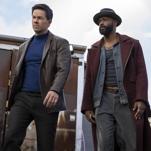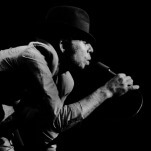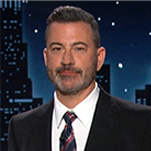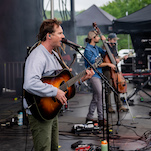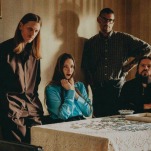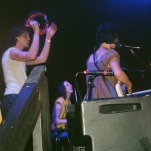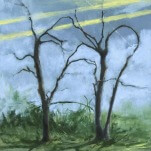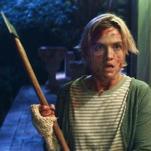Read the First Two Chapters of Sloan Harlow’s New YA Thriller All We Lost Was Everything
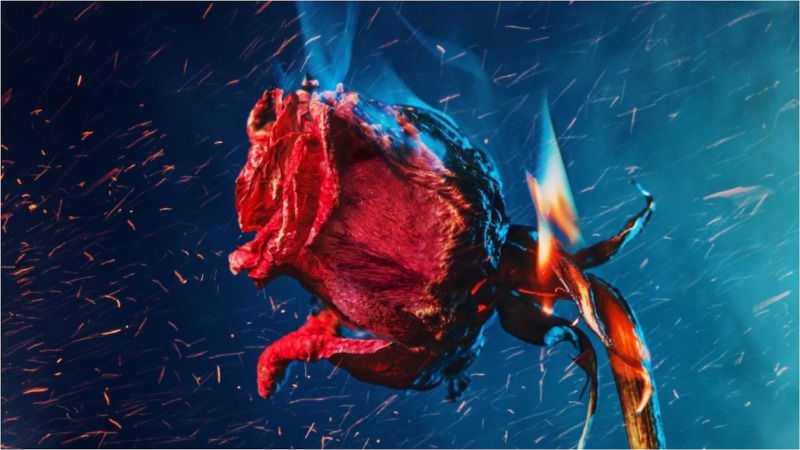
The dreaded sophomore slump is a real phenomenon in everything from sports teams to television shows. After a successful inaugural outing, can the second attempt possibly reach the heights of its predecessor? It even comes up in publishing circles more than you’d think—is the second book in this trilogy good, can an author’s follow-up to a buzzy hit break through again, that kind of thing. Well, for those that enjoyed Sloan Harlow’s New York Times-bestselling debut, Everything We Never Said, get ready: Highly anticipated follow-up All We Lost Was Everything is set to release next month, and its story features even higher stakes, a sexy romance, and surprises along the way.
Like its predecessor, All We Lost Was Everything is a story that’s grounded in grief and that explores the ways loss can change our perceptions of who we are. As River digs into her parents’ pasts, she learns more than she ever expected about her family, and the secrets we keep—even from those we claim to love most. Fast-paced and full of twists, the story is a compelling blend of romance, mystery, and psychological depth.
Here’s how the publisher describes the story.
When eighteen-year-old River Santos’s house burned down, she lost everything. Her clothes. Her guitar. Her songbook.
Most importantly, she lost her father.
But when someone anonymously donates two million dollars to her GoFundMe, it’s like she’s won the worst sort of lottery. She’s a millionaire, but at what cost?
With every person who comes into the diner where she works, she wonders, “Was it you?” The only person she’s sure didn’t donate the money is her extremely hot—and extremely standoffish—coworker, Logan Evans. Ever since he started at the diner, he’s acted like he hates her. Which is why she’s shocked when he helps her save face in front of her ex…
Their attraction can’t be denied, but when River discovers a long-hidden family secret, she suddenly finds herself questioning everyone in her life. Her dad, who wasn’t as perfect as he seemed. Her chaotic mother, who left without so much as a goodbye at the beginning of her senior year. The anonymous donor, whose intentions may not have been altruistic after all. And most especially Logan, who has dark secrets of his own.
After the fire, River thought she had hit rock bottom. But as it turns out, there’s always more to lose…
All We Lost Was Everything won’t be released until May 1, but we’ve got an exclusive look at the book’s prologue and first two chapters of its story for you right now.

Prologue
River
Every Friday, my mom played the lottery. She would stop at the gas station on her way home from cleaning whatever mansion was on rotation that week and buy scratchers for the largest pot on offer. She would win, here and there. Small amounts—sometimes the cost of the ticket, sometimes a little more. Once, she even won a thousand dollars. More often than not, though, she’d come up empty, and she seemed truly surprised every time it happened. I think she really believed that one day, the odds would be in her favor. That one day, she would be a millionaire and magically her life would be better—all our lives would be better. The never-ending debt from her unfinished college degree would be gone just like that. The need for my dad to take on a second and sometimes even a third job would disappear overnight. I could attend college without a single thought about tuition.
We would be rich and happy, but we would be responsible, the kind of family that wouldn’t be destroyed from within by its newfound wealth.
When I turned fifteen and learned about the odds of winning the lottery—“one in three hundred million,” my stats teacher had intoned—I told my mom she’d be better off saving her money instead of wasting it on tickets each week. She’d just waggled her eyebrows and said, “Someone’s gotta win. Why not me?”
As far as I know, she never did win the lottery.
But I did. And all it cost me was everything.
Chapter 1
River
Cemeteries are the greenest places in all of Scottsdale, Arizona. Even greener than the golf course at the nicest country club in town, which I only know because my mom worked there as a housekeeper when I was seven, and her boss used to let me eat ice pops from the snack stand at the thirteenth hole.
Ocotillo Ridge Memorial Park is no exception. There’s no red dirt here, no gravel. No dusty scrub or faded mulch. Just a clear stretch of brilliant green grass, water shortage be damned. The sea of green is broken up only by headstones and a smattering of flowering trees that lace the air with the gumdrop smell of acacia and the grape-soda scent of Texas mountain laurel. Dad loved those pendulous purple flowers, that sweet smell. It’s why I dipped into my GoFundMe money—the dubiously earned nest egg I’d vowed never to touch except in case of emergency—to secure him a spot here, so he could always be near those blossoms.
It’s the trees I focus on now, the way they glow in the morning light. I don’t focus on the way a priest is saying my father’s name—Jay San-TOS—and how it sounds all wrong on his clumsy tongue. The way substitute teachers used to say my name, indifferent, not bothering to understand the vowels or pronunciation, because in an hour that name would no longer exist to them.
Because if I focused on how wrong it sounds, I would have to focus on how wrong all of this is. That my dad is lying there, in a cedar coffin, waiting to be lowered into the ground, instead of standing here by my side. That my mother hasn’t even called, let alone shown up, for his funeral. That life as I knew it burned down to the ground just two weeks ago, when my house caught fire, taking everything with it—my guitar, my songbooks, my diaries, my clothes, everything.
But most importantly, my father.
Because of the extensive damage, the fire department hasn’t been able to tell us exactly what happened, just that it was probably electrical. Everything in our house was so old and half-broken, it honestly could have been anything. And once the fire started, it blazed hot and fast; my dad didn’t even make it out of his bedroom. Everyone says that it’s a miracle that I survived. That I’m so “lucky” that I somehow made it out of the house to the front lawn, where the firefighters found me passed out from smoke inhalation. I have no idea how I did it; all I have of that night are smoke-addled flashes, nothing that adds up to “daring escape.”
And personally? I wouldn’t call any of this “luck.”
Through the fog that has enveloped me ever since I awoke in the hospital, I do notice just how many people are here. I recognize most of them. Gertie, the owner of the diner I’ve worked at for years, presses a tissue to her nose. Teachers from Scottsdale Senior High School, where I’m a senior, as well as staff and students from Mojave Prep, where my dad coached football, stare solemnly ahead. His assistant coaches all stand in a line, wearing an impromptu uniform of slick jackets and ties; the players wear their varsity jackets despite the heat, their expressions grim.
Thank God Tawny’s here. My best friend in the entire world. And after everything that’s happened, sort of my only friend in the world. Everyone has been so kind and helpful, but Tawny McGill is the only person I can bear to be around. She’s also the last person alive, it feels like, who knows me inside and out, who knows what I need without me even having to say it.
My ex, Noah Pierce, is also here, though he has studiously avoided eye contact with me since he arrived with his father. It’s probably for the best, though, since Tawny would explode with protective fury if he got within five feet of me.
Next to the Pierces are a dozen guys from my dad’s regular AA meeting, the “anonymous” part of the equation having long since fallen by the wayside after years of backyard barbeques or the occasional person coming up to us during our weekly breakfast at the diner to share that my dad had literally saved their life.
As I look into the sea of tear-streaked faces around me, at this crowd stitched together by my father’s love and support, I can’t help that little voice inside me that asks: But where is Dad?
It’s a familiar refrain from my life. Anytime I got up to sing, from my first concert at eight to my last one at seventeen, as I’d walk onto the stage, my heels echoing against old, scuffed wood, my first thought always was:
Where is Dad?
I would look out into the crowd, searching only for him. I’d find him: the mole on his left cheek; his thick, black hair; his dark, laughing eyes. He’d raise his hand, wave and wave. In that moment, I was a famous singer, a celebrity. I’d always wave back until Mom would tug down his wrist, embarrassed but smiling as she tucked a strand of blond hair behind her ear.
Where is Dad? I think again. Knowing the answer breaks me.
As if noticing that I am about to fall to pieces, Tawny leans in and whispers in my ear, “I’ve got you, River.”
“We both do,” Tita Anna whispers from my other side, lacing her fingers through mine.
Tawny puts an arm around my shoulder, tucking me in tight. It is the only reason I don’t fly apart. I stay there, in her embrace, through the rest of the ceremony, as the priest finishes his sermon, and then as person after person steps up to share their memories of my father, of the profound ways he touched their lives. Tawny stiffens next to me with each speech, turning herself to rock so I don’t break. She and Tita Anna do their best to form a barrier around me, but not even they can protect me from the end of the funeral, from the moment they lower the coffin—my dad—into the grave.
I’m not ready. I can’t. I turn my head and bury my face in Tita Anna’s black dress. Not yet.
As everyone files by us, murmuring rounds of I’m sorry, and he was such a great man, and I will miss him, I remain there, as still as the headstones surrounding us.
“We should go, love,” Tita Anna finally says, brushing my long, dark hair off my face. It feels like only seconds have passed, but a look at my watch tells me it’s almost noon, which means the ceremony ended an hour ago. Only Tita Anna, Tawny, and I remain, along with a cemetery worker who stands a respectful distance away, shovel in hand.
“Wait,” I say, suddenly frantic, searching for words to put to my impossible feelings. As much as it’s killing me to be here, the second I leave this cemetery, it will all become unbearably real. I cannot leave without my dad. I cannot leave him here by himself.
A hand finds my shoulder. Tita Anna. “He’s gonna be okay. We can come visit him whenever you want.”
“Can I get him a saguaro?” I ask, grasping at anything to hold on to for even one more second to make this moment less awful. There’s a little space to the right of the rectangular hole in the sandy earth, a spot for life in this place that holds so much death.
“Of course,” Tita Anna says, steering me gently toward the car. Tawny follows at my side, a comforting shadow.
While we’re walking toward the parking lot, someone’s phone buzzes and buzzes. I don’t realize it’s mine until Tawny nudges my handbag.
“Do you want to check that?” she asks me. “Or I could turn it off for you?”
“Oh.” I pull out my phone, which is riddled with notifications.
I swipe away the litany of I’m sorrys and If there’s anything I can dos in my texts, about to turn the device off, when a new alert from GoFundMe pops up.
Part of me is still a little embarrassed that a corner of the internet knows my entire sob story, detail after detail laid bare for anyone to see. But I can’t deny how helpful the GoFundMe money has been. We were constantly behind on bills, and it turned out that our homeowner’s insurance had lapsed. Which meant that after the fire, I had literally nothing to my name, no money to rebuild the house, nothing physical to resell, no safety net whatsoever. The second I voiced concern about paying my hospital bill, Tawny waved a hand impatiently.
“Don’t worry. It’s all taken care of.”
“But how?” I asked, bewildered.
She held up her phone, showing me the post she’d written on GoFundMe, describing what had happened alongside a picture of me and my dad at the Prickly Pear, a local music venue where I often sang at open mic night.
“You didn’t have to do that,” I protested, but she just shrugged.
“It’s literally the least I can do, given . . . well, everything.”
For nearly two weeks leading up to the funeral and for days after, my phone kept buzzing with notifications. A five-dollar donation here. Seventy-five dollars there. Someone even gave five hundred. Some of the donations were from names I recognized, others from people in faraway states who had read about what had happened, and some of the donations were simply anonymous. Slowly, the total figure had ticked up, first into the hundreds, then the thousands, and finally, mind-bogglingly, into the tens of thousands. I was both blown away by everyone’s generosity and thoughtfulness, and sickened by the thought that I was profiting somehow on this horrible tragedy. When I’d said as much to Tawny, she’d just laughed and shaken her head.
“Only you, River, could take something good and turn it sideways. It’s not your fault the healthcare system here is so expensive. Or that your parents didn’t have untold generational wealth. It’s not blood money—it’s a lifeline. Just take it and say thank you.”
So I did.
It takes a second now for the page to load, but when it does, I stop walking.
Tawny and Tita Anna don’t notice for a few steps. Then Tita Anna turns around and dashes to my side when she sees my face. “Are you okay? Did something happen?”
I can’t speak, so I hold up my phone and show her and Tawny the GoFundMe figure. Suddenly, those digits have many more zeros. Many, many more.
Because someone has just anonymously donated two million dollars.
Chapter 2
River
SIX MONTHS LATER
I’m sitting on a crate of fat, ripe oranges, huddled and shivering, squeezed between the towering shelves of produce in Gertie’s Diner’s walk-in cooler. My head leans against a cardboard box full of white onions as heavy and round as softballs. Through the small holes on the side, I can smell how fresh they are, how I’ll weep when I slice into them tomorrow during prep.
Ironic, as I’m trying—and failing—not to cry right now.
It’s all because of my first table. It had been a family: a mom, dad, and little girl with long, black hair. “Three slices of carrot cake,” the dad had said. “I know it’s kind of early for it, but we always do cake for breakfast on her birthday.”
For one moment, the entire scene had shifted—for one moment it had been me and my parents sitting there, ordering cake for breakfast like I’d done on every birthday for as long as I could remember. But just as quickly, the scene rearranged itself, and reality came crashing back in. It wasn’t me and my parents sitting there—and it never would be again.
I’d barely kept it together before hefting open the heavy metal door and diving into the blissfully frigid air of the walk-in, where I’ve been hiding for ten very cold minutes.
Now I hear the walk-in door push open, the telltale flap of someone walking through the curtain of plastic strips. I can’t see the doorway from where I’m currently hidden amongst the towers of eggs and bricks of cheddar, but I know who it is.
I wipe my eyes and take a deep breath, trying to get a grip.
“Sorry, Tawn. I’m coming.”
But when I open my eyes, I give a startled exhale, my breath curling visibly in the cold air. Because I’m not looking up into the hazel gaze of my best friend. Instead, it’s Logan Evans, the last person I’d ever want to catch me crying in a walk-in.
“You,” I say, “are not Tawny.”
“No,” he says, “I am not.”
He crosses his muscular arms, tilting his head at me as the chiller compressor roars to life. A lock of thick dark hair falls over his forehead, nearly touching his raised brow. His jaw is set tight, making his face look even more chiseled than normal.
There’s no denying it: Logan Evans is hot. He’s been here seven months, and his beauty still catches me off guard.
Tawny had nearly dropped her stack of plates the first time we’d seen Logan talking to Gertie about the HELP WANTED sign on the front windows last year. “Who the hell is that?” she’d said. “He looks like a prince Disney had to fire for causing too many early sexual awakenings.”
But on his first day, I accidentally crashed into him with a tray full of Diet Cokes. I’d scrambled for a towel to mop at his soaked shirt, stumbling over myself apologizing to him. But instead of accepting my help, he’d stepped back, as though my touch had burnt him. When I’d met his gaze, his expression had taken my breath away. There was an unmistakable fury etched into his features, like he hated me, even though he’d only known me for less than an hour.
After that, no matter how hard I tried to be friendly, he barely spoke to me, beyond what was necessary. “Can you refill the mayo?” was what passed for small talk between us.
“He knows he’s hot,” I’d complained to Tawny, watching him work a table with two giggling grandmas, hating the way my stupid heart hammered at the sight of his smile, hating how much I noticed him when he never noticed me. Hating the way I cared, even though I already had the perfect boyfriend. (I try not to linger on the “had.” I try not to linger on thoughts of him at all.) “He uses that face like a weapon.”
Now, I wipe my eyes and turn to face Logan. “Sorry, just having a bad day.”
Logan sinks into a squat until we’re eye level, so close I can see flecks of yellow scattered in his bright blue irises. For one fleeting moment, I almost swear I see a flicker of warmth there. He reaches out his hand, and all of a sudden, I stop breathing.
Is Logan Evans, who has barely ever said five full sentences to me, who rarely smiles or shows any emotion toward me whatsoever besides irritation, going to comfort me?
But instead of touching me, he stretches behind me, grabbing something wedged behind my back. The motion knocks me off-balance, and I have to put my hands out to catch myself.
“Gertie asked me to get more oranges. We’re out of juice.” His eyes kick back to mine. “You’re . . . sitting on our last carton.”
Perfect. Just perfect. Just when I’m hoping this scuffed metal floor will open and swallow me whole, the walk-in door bursts open again.
“I took care of them, got them carrot cake slices. Honey, I can’t imagine . . .” Tawny trails off as she blinks down at Logan’s back as he silently gathers oranges.
When his arms are full, Logan rises and makes his way out from between the shelves, nearly dropping an orange as he takes great care to not brush against either of us. He doesn’t spare either of us a single glance.
Tawny’s nostrils flare. “I swear, he acts like we ran over his puppy. Would it kill him to be nice?” She gives my face a good look. “Seriously. Are you okay?”
I sniffle and Tawny hugs me. It feels good to hug her back, to be surrounded by the coconut scent of her shampoo, the warmth of her body in this icy chiller.
I shake my head. “All good. Minus the whole sitting-on-Logan’s-oranges fiasco.”
Tawny rolls her eyes. “Oh, screw him. He should be so lucky to have you sitting on his oranges.”
When I’m ready, Tawny leads us back out to wipe down the stack of dirty menus at the front counter. I’m scrubbing a dubious stain on the dessert section when I notice the picture of Belgian waffles. Noah’s favorite. I feel a pinch in my heart, like I always do, at just the memory of his name.
Perfect, beautiful, heart-gouging Noah.
“Stop thinking about him.” Tawny cuts into my thoughts. That’s the problem with having Tawny as a best friend: She can read my mind.
“I wasn’t,” I lie.
“You sighed no less than three times this past minute.” Tawny tosses another wiped menu on the clean pile. “You really need better taste in men, Riv.”
“You’re one to talk, you know.” I raise a brow at her. “At least I didn’t carry a torch for the world’s douchiest prom king.”
“How dare you.” Tawny playfully smacks me with a plastic menu. “I didn’t carry a torch. It was more of a match. Besides, that was back when I was young and foolish.”
“That was five months ago,” I say, deadpan.
Tawny tosses her ponytail to brush playfully against my face. “Like I said. Young and foolish.”
I pick up another menu and pick at a dried piece of yolk on the corner. “You know, if you had just asked him out, he would have said yes.”
There’s no way he wouldn’t have. She’s gorgeous, with blond hair that she’s constantly dyeing different colors, hazel eyes, and a heart-shaped face. Tawny’s not just beautiful; she’s charming in a way that sneaks under your skin and pulls you firmly into her orbit.
If there is one bit of luck in my life, she’s it, thanks to whatever scheduling god seated her next to me in Spanish class sophomore year. She was new that year, but somehow she ended up taking me under her wing, as if she were the one who’d been there all along. Other than Tita Anna, she’s the closest thing I have to family now.
“Please.” Tawny flicks a dismissive hand in the air. “Matt’s old news, baby. I saw on Insta that he showed up to graduation completely blitzed, and when he walked, or should I say stumbled, across the stage, he tried to go to the podium to give a speech.”
“Whoa.” I blink. “What was his speech?”
“I think he just yelled, ‘Roll tide!’ over and over.” Tawny shrugs. “See? Bullet dodged.”
My laughter dies down, and I fall quiet. “Sorry you missed the live show. Sorry you missed the whole thing,” I say in a low voice. I can feel the painful pressure from earlier come back, rising in my chest.
I couldn’t stomach walking in graduation, not when neither of my parents would be in the audience watching me. In solidarity, Tawny had spent the day at the movie theater with me, hopping from one showing to the next, buying me popcorn and Sour Patch Kids, handing me tissue after tissue, all without ever making me feel like I was a mess.
“Hey. Hey.” Tawny gives me an earnest look, brows furrowed. “Don’t you dare apologize. My place is by your side. Always.” She reaches out, squeezes my arm.
“Besides, Mom wasn’t gonna be there anyway. Berlin, that time. They had her working ten days in a row.” She shrugs. “I can’t imagine . . . just flying nonstop across the ocean. Back and forth, back and forth. What an exercise in futility.”
Tawny’s mom is a flight attendant. A busy one. Constantly taking overtime and extra shifts to make life as a single mom work. She’s almost never home. It makes my heart ache for Tawny, though she tells me to save my pity for someone else. As far as she’s concerned, the arrangement works out just great. Minimal supervision means she can live her life how she wants to without constant fights. “I swear we love each other more because we see each other less,” she always says.
Well, used to say. She’s careful never to say anything like that around me these days.
Logan passes us, carrying a stack of menus, his blue eyes piercing. “You’ve got a table, Santos. Three waters and a Coke.”
“Oh,” I start. “Thanks, Logan. You didn’t have to . . .”
But he’s not even listening, his back already to me, and I hate myself just a little bit for registering the muscles moving beneath his T-shirt, the way his jeans fit perfectly.
Shaking myself out of it, before Tawny can notice this too and chide me, I go take my table’s orders, apologizing profusely for keeping them waiting. They’re incredibly kind and end up leaving a generous tip. I clutch the folded bills in my hand, my heart pumping faster. And I wonder, as I always do:
Was it them? Could they have been the anonymous donors?
It’s a game I find myself playing nearly every day. But every lead I’ve chased for the last six months has been a dead end. Ex-players of my dad’s who were now playing professionally. Members of his AA group. A secretly wealthy family member. I even checked with GoFundMe. No, no, no, and that goes against our policy.
“Not them,” Tawny singsongs as she sweeps by, watching me staring dazedly at my tip.
And there’s that pesky mind reading again. I quickly shove the bills in my pocket. “How do you know?”
She shrugs. “I mean, I don’t. But, Riv, we’ve been over this. Why does it even matter who gave it? Money is money.”
Part of me knows she’s right, but the bigger part of me can’t set aside the mystery. It feels like one more loose thread in my ever-unraveling life. And it feels different, somehow, from accepting the random twenty here and there. Two million dollars from one person? Who has that kind of money, and who would give it to me without expecting so much as a thank-you?
For the next hour, though, I’m blissfully busy and have no choice but to set that mystery aside. Tawny and I bob and weave around each other like figure skaters on a black-and-white-checkered floor. It’s a synchronicity that comes from waiting tables here at Gertie’s since I was fifteen and my coworker being my very best friend.
“Table six needed more ketchup. I brought them a bottle,” Tawny says as she ducks under my tray full of iced teas.
“Saw that you got Mrs. Lewis. I dropped off her extra ranch,” I say, hanging the next ticket in the kitchen.
A few times, I swear I feel Logan watching me, but every time I look up, he’s absorbed in an order or ringing up someone’s tab. Miracle of miracles, I don’t have any more embarrassing meltdowns in front of him, and by the time we’ve grabbed our bags from the lockers and clocked out, Tawny’s sufficiently cheered me up.
When we walk out the back door, we hear a low, raspy meow. A large, scruffy tabby cat rounds the corner, twitching a crooked tail.
“Tigery!” I gush, stooping to scratch behind his ears.
It’s taken patience and a lot of Gertie’s chicken, but the wary stray cat that’s lived behind the diner has finally let me love on him. Tigery’s been a huge comfort in the days since the fire. As soon as I get a place that allows pets, I’ll pamper him with feather beds and spoon-fed caviar like he’s a feeble princeling.
“You always sound like you’re reuniting with your long-lost husband after decades apart,” Tawny muses. “You saw him this morning.”
“Well, maybe a few hours is a decade in cat years. And, I don’t know, Tawn. As far as husbands go . . . I feel like I could do a lot worse than Tigery.”
Tigery flops on the concrete and stretches out his paws.
“River,” Tawny says, “we are not in marrying-our-cat territory yet. Okay? And I don’t think it will ever come to that.” Tigery slaps his tail on the concrete, as if in agreement.
“Thank you both for the vote of confidence,” I say.
After another scratch or two, Tigery is sated and trots off into the shade. I stand, brushing dirt from my legs.
“Thanks for today,” I say, giving Tawny a hug. “Love you so much.”
“Duh,” she says, kissing my cheek. “Love you more.”
I walk back to my car, feeling good—happy even. But as soon as I slam the door shut, silence envelops me, an assassin I should have seen coming. The Arizona June heat is already choking me and making the side mirror sag, the duct tape holding it in place softening in the sun. And with no Tawny, no murmur of customer voices, no ding of the diner door, it all comes back.
The thing that is always lurking, the thing that, for blissful short slivers of the day, I sometimes forget. It comes up right now, all of it, from the basement of my heart:
My mom is gone. My dad is dead. And my life will never be the same.
All We Lost Was Everything will be released on May 6, but you can pre-order it right now.
Lacy Baugher Milas is the Books Editor at Paste Magazine, but loves nerding out about all sorts of pop culture. You can find her on Twitter and Bluesky at @LacyMB





